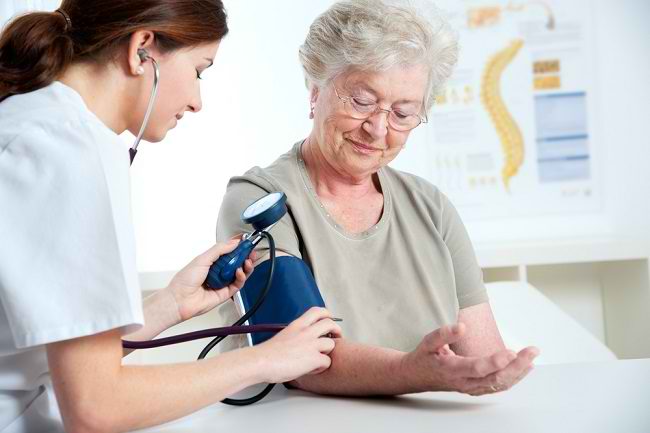Normal Blood Pressure in the Elderly and How to Keep it Stable
Normal blood pressure values in the elderly are important to be monitored regularly. The reason is the risk of high blood pressure will increase with age. Therefore, the elderly need to routinely do blood pressure checks so that their normal blood pressure values can be monitored properly.
Blood pressure is a measure to determine how strongly the heart organ pumps blood and circulates it throughout the body. The value of blood pressure in each person varies and is influenced by various factors, such as age.

Therefore, normal blood pressure values in the elderly can differ slightly from normal blood pressure values in adults, children, and pregnant women.
What is the Normal Blood Pressure Value in the Elderly?
In healthy adults, normal blood pressure values are in the range of 90/60 mmHg to 120/80 mmHg. In contrast to young adults, normal blood pressure values in the elderly are in the range of slightly higher numbers, ie 130/80 mmHg to 140/90 mmHg.
The number 130 or 140 is the systolic number, which is the pressure in the blood vessels when the heart contracts to pump clean blood throughout the body.
Meanwhile, the number 80 or 90 shows the diastolic number, which is the pressure of the blood vessels when the heart does not contract and receives blood flow back from the whole body carrying dirty blood.
From the figures above it can be seen that the value of normal blood pressure in the elderly is higher than normal blood pressure in adults.
This is because blood vessels tend to become harder or stiffer with age. Hardening of blood vessels makes the heart have to work harder, thus making blood pressure in the elderly higher.
What are the Symptoms and Complications of Blood Pressure Problems in the Elderly?
An elderly person is said to have high blood pressure or hypertension when his blood pressure reaches more than 140/90 mmHg, whereas low blood pressure or hypotension when the elderly blood pressure is below 90/60 mmHg.
When reaching the age above 60 years, the blood pressure of an elderly person will tend to start increasing. However, blood pressure will tend to decrease when the elderly reach the age of 80 years or more.
High or low blood pressure in the elderly may not cause symptoms. However, the elderly or families who care for them need to be vigilant if the elderly have hypertension or hypotension accompanied by symptoms of dizziness, weakness, chest pain, shortness of breath, decreased consciousness, fainting, and weakness of limbs.
This could be a sign that the elderly have hypertension complications, such as stroke, heart attack, heart failure, or impaired kidney function. These complications are at high risk for elderly people who have hypertension with a history of previous comorbidities.
Therefore, the elderly who experience the above symptoms need to be immediately taken to the doctor to get a proper examination and treatment.
How to Maintain Normal Blood Pressure in the Elderly?
The elderly can maintain their blood pressure to remain normal by routinely living a healthy lifestyle. The following are the steps to live a healthy lifestyle in the elderly:
1. Eat nutritious food
Start by consuming balanced nutritious food. To maintain normal blood pressure and reduce the risk of various diseases, the elderly are advised to consume low-fat foods and reduce salt intake.
Instead, choose foods that are rich in fiber, such as brown rice, vegetables, fruits, and beans. The elderly also need to drink enough water every day to prevent dehydration.
2. Exercise regularly
Exercising regularly can help you maintain an ideal body weight, prevent obesity, and keep blood pressure stable. Do exercise regularly for 30 minutes every day or at least 3 times a week.
The recommended types of exercise for older people are walking, swimming, cycling, or elderly gymnastics.
3. Do not smoke and limit alcohol consumption
Smoking and consuming excessive alcoholic beverages can increase the risk of hypertension in the elderly. Therefore, the elderly are advised to stop smoking and avoid exposure to cigarette smoke and limit the consumption of alcoholic beverages.
4. Get enough sleep
Sufficient sleep and rest are beneficial for maintaining a healthy heart and blood vessels. Lack of sleep can interfere with heart function and increase the risk of developing hypertension and stroke.
As you get older, your sleep needs will decrease. The average sleep time for adults is around 7-9 hours per day. Meanwhile, elderly people aged 65 years and over, their sleep time will be reduced to 7-8 hours per day.
In addition, to ensure that blood pressure values remain normal, the elderly also need to routinely check their blood pressure at the health center, doctor's office, or use their own tensimeter at home.
If the blood pressure in the elderly remains high, this condition should be seen by a doctor.
To treat high blood pressure in the elderly, your doctor may advise the elderly to live a healthy lifestyle and prescribe hypertension medications. After getting treatment, the elderly still need to monitor their blood pressure regularly.
Normal blood pressure values in the elderly do tend to be higher, when compared to adult blood pressure values.
However, if it reaches the category of hypertension or hypotension, the elderly need to routinely undergo a doctor's examination, especially if the blood pressure abnormality has caused symptoms of severe headaches, chest pain, shortness of breath, and decreased consciousness.
Label : Health
Comments
Post a Comment